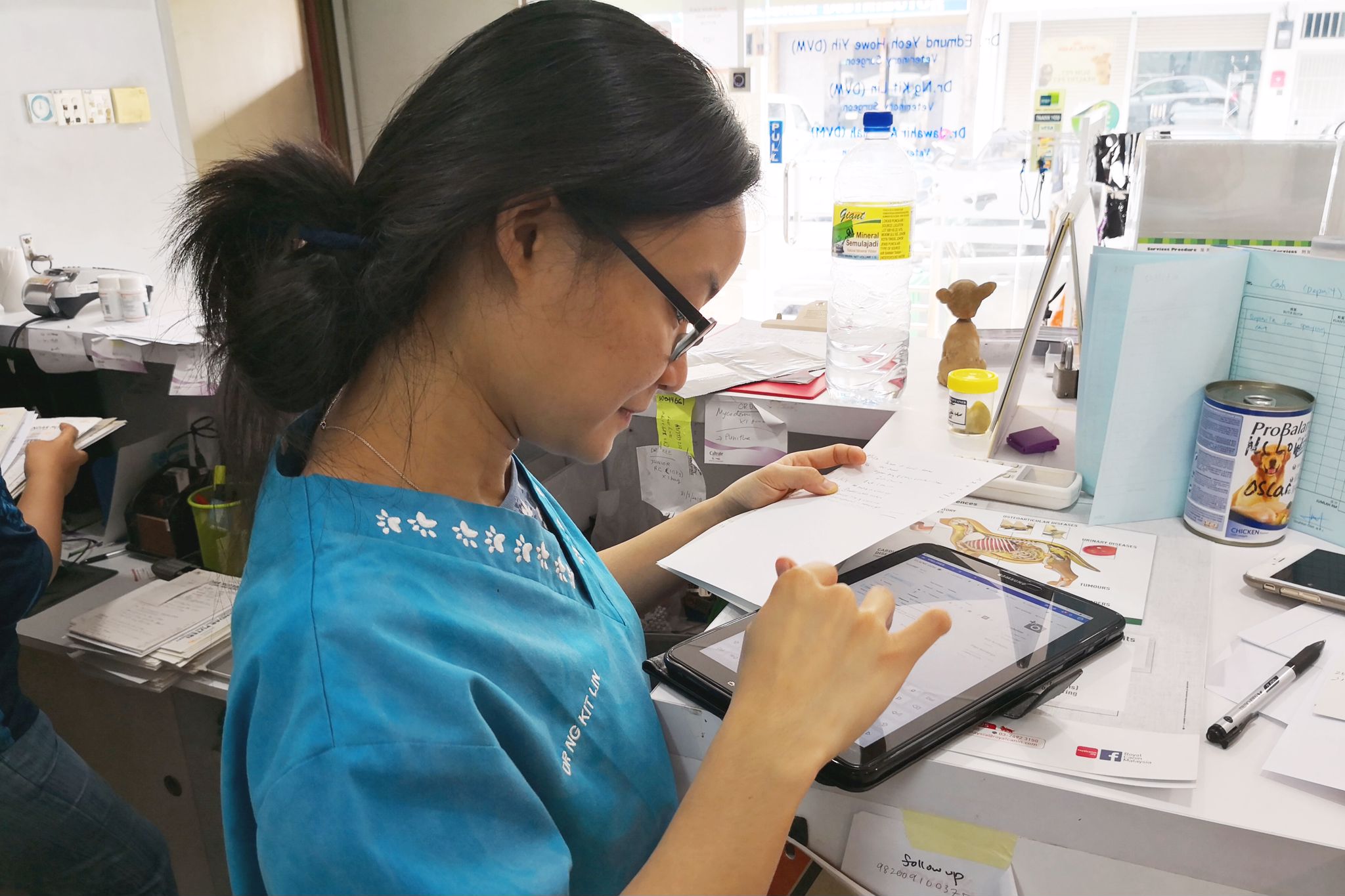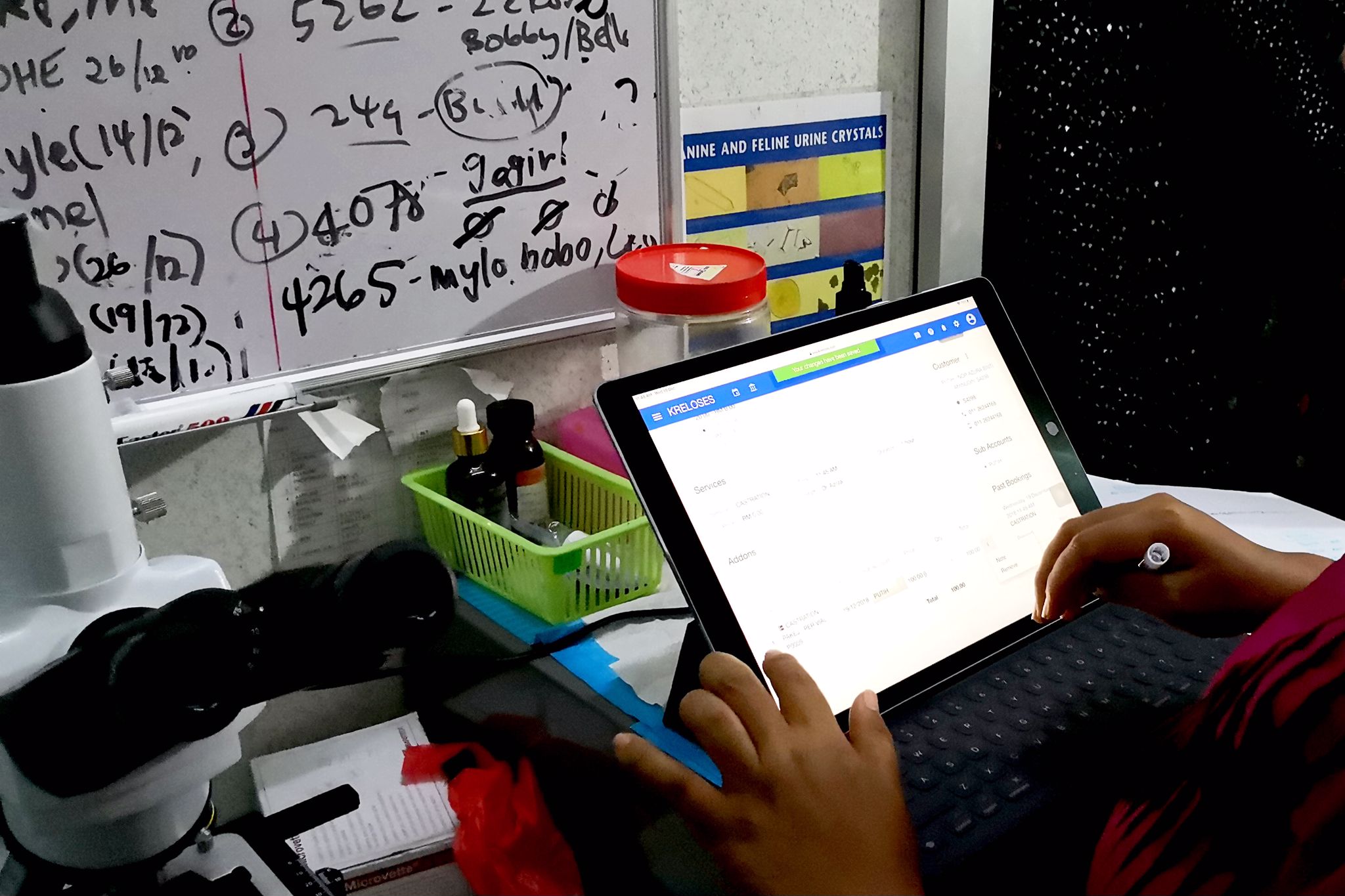Embracing Technology, Overcoming Barriers
 Dr. Edmund and his team are setting up their tablet to ensure an improved customer service. Kreloses is mobile-friendly with easy-to-understand screens in order to create the simplest operations process for our users.
Dr. Edmund and his team are setting up their tablet to ensure an improved customer service. Kreloses is mobile-friendly with easy-to-understand screens in order to create the simplest operations process for our users.Most of the countries around the world have seen the benefits of technology adoption and Malaysia is no different. From educational institutions, healthcare centres to small businesses, almost no industry can dodge the usage of mobile phones and tablets. With the rise of portable electronic gadgets, it is followed by an increasing number of software evolving themselves to be mobile friendly to accommodate the needs of businesses and consumers. The adoption of tablets in businesses has since improved the service and operations quality as well as made work more convenient for the staff. The increased mobility of staff has also played a part in maximising the productivity of businesses.
 Dr. Ng is keying in details from her previous consultation to the tablet as part of the clinic's digitalisation process. More than 40% of Kreloses users are on mobile and the number is still increasing.
Dr. Ng is keying in details from her previous consultation to the tablet as part of the clinic's digitalisation process. More than 40% of Kreloses users are on mobile and the number is still increasing. Digitalisation means taking a big step further away from pen and paper. This is not only environmentally friendly but economical as well considering the amount of expenses that can be reduced from refilling papers and stationery. Mobile phones and tablets can do beyond what pen and paper have been doing. From taking notes, photos, recordings to setting a reminder and alarm, almost everything can be done within one's fingertips. These devices can even be used for freehand drawings and writings, minimising the need to use the traditional pen and paper. People are getting more tech-savvy as time passes and eventually, this adoption will definitely be more prevalent in near future.
 Dr. Diana and her partner are checking out the various features available on Kreloses. As soon as her team imported all information into the system, their clinic will be free from the massive amount of folders and papers.
Dr. Diana and her partner are checking out the various features available on Kreloses. As soon as her team imported all information into the system, their clinic will be free from the massive amount of folders and papers.The endorsement of mobile phones and tablets as part of the operations process in certain industries like healthcare centres is beneficial. Some medical staff worry that using computers in the process may make patients feel ignored and disconnected. This can be solved with tablets which can be dubbed as 'digital paper' for its compact size and portability. In this case, consultations can still be just as personal, breaking any previously desktop-inflicted barriers with the implementation of tablets and mobile phones in the operations process of a healthcare centre. Besides that, doctors and medical staff alike can conveniently jot down consultation notes, prescription or even scribble on an image to provide better explanations to the patients.
 A veterinarian is jotting down consultation notes and prescribing medication to the pet from her previous service. A mobile-friendly software like Kreloses helps you simplify your operations process and provide you with ample convenience.
A veterinarian is jotting down consultation notes and prescribing medication to the pet from her previous service. A mobile-friendly software like Kreloses helps you simplify your operations process and provide you with ample convenience.Furthermore, such adoption will be able to undoubtedly improve the service quality of businesses. Patients will appreciate quick and accurate consultation rather than waiting for the staff to jot down notes manually by hand and possibly making mistakes in certain parts. This can be achieved within only a few taps of a finger before sending the information instantaneously to the next responsible department or staff. In this situation, more time is saved and the patients can proceed to the next step shortly after. Besides that, less staff are needed to be involved in the process as well since they do not need a middleperson to deliver the information anymore compared to before. The adoption of tablets will produce an agile, systematic and convenient operations process.
In this generation where the amount of mobile phones and tablets users is increasing every minute, many companies are developing their very own application or software to cater to industries and public demand. This low-cost and high-efficiency model of using mobile phones and tablets to run a business is likened and incorporated by many business owners as the uptake is still getting higher deliberately. Of course, this is not only applicable to the healthcare industry and it remains relevant for many other industries as well. No matter how some people argue about the implementation of technology in businesses is not a good idea, we cannot deny that technology has helped mankind tremendously in advancing and improving the quality of life.